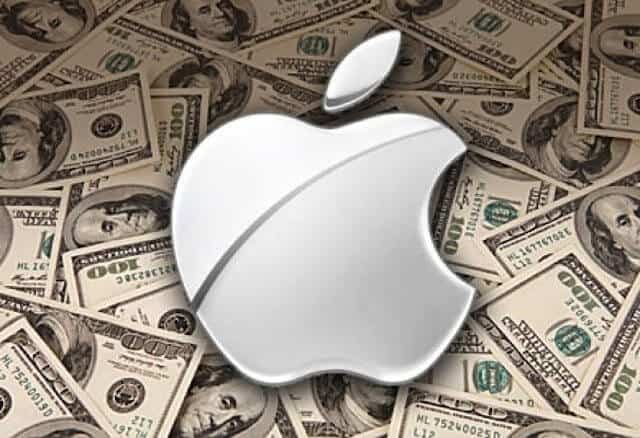Apple Inc. (NASDAQ:AAPL) smashed through a $400 billion market cap making itself the world’s largest company just a couple of years ago. Today, with a cap of $765 billion, the company is double the size of its next largest rival, Microsoft Corporation (NASDAQ:MSFT). Apple seems destined to become the first trillion dollar company, but is it still a “no brainer buy” at $130 a share?

It’s easy to get carried away by all the hype over the firm. While many continue to pound the table on Apple, it’s important to have some perspective on the situation.
First, about 80% of the company’s revenue came from just two products in the first quarter, iPhone and iPad – with iPhone kicking in the vast majority of those sales. Though this may not be too disturbing given the brand loyalty and incremental innovation of the “i-duo,” the company remains a two-trick pony.
Apple is not Dell, it’s not Nokia
International growth may continue to be a source of incremental gains, but one must believe that at some point smartphone saturation and slowing growth may occur. I remember 15 years ago during the “Internet bubble” that names such as Dell, Nokia, and EMC were touted as “no brainer” buys. While their valuations were stratospheric when compared to Apple’s today, their not-so-lock-tight business models, competitive susceptibilities/customer not-so-loyalty, and lack of innovation led to some mighty downfalls.
But despite its monstrous market cap today, Apple’s valuation sits at a very palatable 15X consensus analyst earnings estimates for its September 2015 fiscal year. The market continues to be skeptical about the company’s ability to churn out higher numbers. Even if growth slows, Apple would not be susceptible to the downside that your Dells and Nokias saw, given their insane valuations.
With the recent release of the Apple Watch, the company has applied another growth vehicle to its arsenal. Even with robust sell-through, however, one must believe that the product’s success on a revenue and profitability scale will ultimately probably be more iPad like, than iPhone like, if that, longer-term. And although it’s still early to know for sure, and sales have been brisk, the reviews on the Apple Watch have not been spectacular.
And therein is the challenge for Apple going forward. Although many like to look in the rear view mirror and pile up all of the company’s successes over the past decade, as an investor you need to be thinking about the future.
In order for Apple to make it to a $1 trillion market cap, it will have to create another $230 billion dollars of capitalization. While that represents roughly 30% upside from current levels, $230 billion is roughly the size of J.P. Morgan or Wal-mart and more than Procter & Gamble or Pfizer.
Apple Watch might not be the new iPad
So some questions for investors to consider are whether the company can continue to see incremental growth from new versions of iPad and iPhone, whether Apple Watch proves to be a forward iPad-like success or not, and whether the product pipeline is strong enough to help the bottom line should IPhone and iPad show some kinks in the armor.
As an Apple shareholder myself, I’m betting on continued gains going forward, although I’m expecting nothing like the performance of the past 7-8 years. Even if Apple’s growth does slow, it will continue to be a cash cow, and will have the means to offer value, both in dividend growth and share buybacks.
While it could be argued that its best days are behind it, given its scale, market penetration, and customer loyalty, I think it’s hard to fathom a scenario where Apple’s stock price falls off the face of the earth. Still, if you choose to buy Apple at these levels, I think your expectations need to be reasonable since technology is a fickle space where one needs to expect the unexpected. Thus, I would be wary of anyone who thinks the company is a no-brainer.
Trusted & Regulated Stock & CFD Brokers
What we like
- 0% Fees on Stocks
- 5000+ Stocks, ETFs and other Markets
- Accepts Paypal Deposits
Min Deposit
$200
Charge per Trade
Zero Commission on real stocks
64 traders signed up today
Visit Now67% of retail investor accounts lose money when trading CFDs with this provider. You should consider whether you can afford to take the high risk of losing your money.
Available Assets
- Total Number of Stocks & Shares5000+
- US Stocks
- German Stocks
- UK Stocks
- European
- ETF Stocks
- IPO
- Funds
- Bonds
- Options
- Futures
- CFDs
- Crypto
Charge per Trade
- FTSE 100 Zero Commission
- NASDAQ Zero Commission
- DAX Zero Commission
- Facebook Zero Commission
- Alphabet Zero Commission
- Tesla Zero Commission
- Apple Zero Commission
- Microsoft Zero Commission
Deposit Method
- Wire Transfer
- Credit Cards
- Bank Account
- Paypall
- Skrill
- Neteller
What we like
- Sign up today and get $5 free
- Fractals Available
- Paypal Available
Min Deposit
$0
Charge per Trade
$1 to $9 PCM
Visit Now
Investing in financial markets carries risk, you have the potential to lose your total investment.
Available Assets
- Total Number of Shares999
- US Stocks
- German Stocks
- UK Stocks
- European Stocks
- EFTs
- IPOs
- Funds
- Bonds
- Options
- Futures
- CFDs
- Crypto
Charge per Trade
- FTSE 100 $1 - $9 per month
- NASDAQ $1 - $9 per month
- DAX $1 - $9 per month
- Facebook $1 - $9 per month
- Alphabet $1 - $9 per month
- Telsa $1 - $9 per month
- Apple $1 - $9 per month
- Microsoft $1 - $9 per month
Deposit Method
- Wire Transfer
- Credit Cards
- Bank Account



